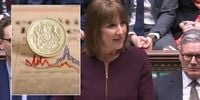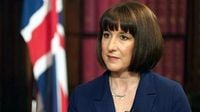Chancellor Rachel Reeves delivered her Spring Statement in the House of Commons today, revealing a significant downward revision of the UK’s GDP growth forecast for the year. The forecast has been halved from 2% to just 1% for 2025, a move that has drawn criticism from opposition parties and raised concerns about the UK economy's resilience.
In her address, Reeves acknowledged the tough economic landscape, stating, "The world is facing economic challenges and uncertainty," but expressed optimism about the long-term outlook. She projected that GDP growth would recover to 1.9% in 2026, with further growth anticipated at 1.8% in 2027, 1.7% in 2028, and 1.8% in 2029, as reported by the Office of Budget Responsibility (OBR).
Despite these positive forecasts, some analysts warn that the current figures could signal a higher likelihood of a recession. Shadow Chancellor Mel Stride criticized Reeves, accusing her of "tanking" the economy. This exchange highlights the contentious atmosphere surrounding the Spring Statement, as the government grapples with economic pressures.
Reeves emphasized her administration's commitment to fostering economic growth through various initiatives, including a focus on housing. She announced plans to encourage more house building, streamline the planning process, and significantly increase defense spending to 2.5% of GDP, with a goal of eventually reaching 3%. This commitment reflects a broader strategy to bolster national security while also addressing economic growth.
Additionally, the Chancellor noted that the OBR had forecasted that households would be approximately £500 better off this year due to the changes made in the Budget. This statement aims to reassure the public amid rising living costs and inflationary pressures.
On the inflation front, Reeves reported a decrease in the Consumer Price Index (CPI), which fell from 3% in January to 2.8% in February. She expressed confidence that the Bank of England's target of 2% inflation would be achieved by 2027. However, the OBR's latest forecasts suggest that CPI could rise to 3.2% in 2025, up from an earlier estimate of 2.6% in October.
In a surprising move, Reeves announced a freeze on certain benefits, including a 50% cut to the Universal Credit Health element for new claimants. This decision, which comes amid an expected £4.8 billion cut in welfare benefits, has raised eyebrows among experts, who argue that it may exacerbate the financial strain on vulnerable households.
Reeves defended this move by stating that with rising welfare costs, more needed to be done to control expenditures and encourage greater workforce participation. The government faces a delicate balancing act as it seeks to manage public spending while also addressing the needs of its citizens.
The OBR's outlook remains cautious, indicating that the long-term fiscal environment is challenging. If global trade disputes escalate, particularly with the potential for significant tariff increases, the UK GDP could be adversely affected, potentially reducing current surpluses to nearly zero.
Furthermore, the OBR has projected that borrowing will be £3.5 billion higher and debt 0.6% of GDP higher by the end of the decade compared to previous forecasts. This underscores the fiscal pressures facing the government as it navigates economic uncertainties.
Reeves also highlighted her administration's commitment to tackling tax evasion, aiming to generate an additional £1 billion in revenue. However, she confirmed that her statement does not include any new tax increases, a point that she reiterated to reassure the public and businesses alike.
The OBR's forecast indicates that the tax-to-GDP ratio is expected to rise to a post-war high of 37.7% in 2027-28, reflecting the government's efforts to balance the budget amid growing demands for public services.
As the government looks ahead, public spending is projected to rise to 45% of GDP next year before gradually declining to 43.9% by 2029-30. This trajectory suggests a long-term strategy aimed at managing public finances while responding to the needs of a changing economy.
Market reactions to the Spring Statement have been mixed, with the GBP/USD exchange rate exhibiting modest bearish pressure. The 10-year UK government bond yield has fluctuated, reflecting investor sentiment regarding the government's fiscal outlook.
In conclusion, while Chancellor Rachel Reeves' Spring Statement offers a cautious optimism for the future, it also reveals significant challenges that the UK economy must confront. The government's ability to stimulate growth while managing fiscal pressures will be critical in the months and years ahead.







